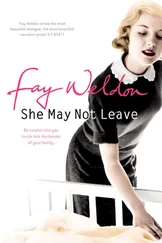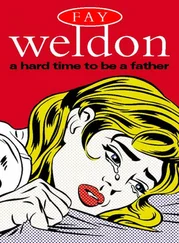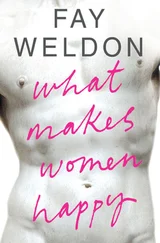London, New York, Toronto and Sydney
Cover Page
Title Page Mantrapped Fay Weldon London, New York, Toronto and Sydney
Trisha leaves home
Writer’s note
Trisha and her mattress
Riches to rags
Trisha faces the future
Novels are not enough
Times I have cried in public
Trisha’s mistakes
On the anger of mothers
Trisha starts a new life
A selection of antecedents
Life in the slow lane
Fading customs
At the dry-cleaners’
A lifetime of keeping clothes clean – three pages the nondomestic reader is free to skip
To the Novel!
Peter collects his dry-cleaning
On the question of souls
Opening salvos in a marriage, that is to say, my own
Consequences. The past catches up
Doralee waits
Gynaecological dreams
A gynaecological history
Still waiting
All that bad stuff
And more waiting
On the villainy of women
A good explanation for absence
Back to the past
Doralee, Trisha and Peter
What will happen next?
Trisha, Doralee and Peter visit the psychiatrist
On psychoanalysts, psychiatrists, psychologists and psychotherapists—and how to lose readers
Trisha, Doralee and Peter visit the parson
Feminist!
At Kleene Machine
Strange things do happen
Doralee is tired
Selling up and moving on
Making good
Trying to get out of the city
Doralee adjusts
A home to go to
Temptation
Home and normality is restored
P.S. Ideas, interviews & features…
About the author
Split Personalities Louise Tucker talks to Fay Weldon
LIFE AT A GLANCE
FAVOURITE THINGS
A Writing Life
About the book
The Real Me? By Fay Weldon
Read on
Have You Read?
About the Author
Praise
Also by Fay Weldon
Copyright
About the Publisher
Trisha had been rich and Trisha had been poor and she knew it was better to be rich. Now she was to be poor again.
The mattress Trisha slept upon was the most expensive on the market: she took consolation from that. Madonna had one like it. Trisha bought it after she won the lottery, nine years back. The claims the manufacturers made for it were true. When she woke in the morning her joints were not stiff and she had no trace of back-pain. She might on occasion wake weeping but she did not wake hurting.
Now she was to ache again. There would be no room in her new abode for so large and lavish a bed as hers. She had thought herself so resolved and steady of purpose, so unsentimental, so unattached to belongings, but now suddenly she felt weak at the knees and wanted to cry. She was alone in the world, without even a decent bed or permanent pillow on which to lay her head. Life once had seemed so easy. You did your best and it worked out all right. The advertisement in the catalogue had shown a young woman sitting alone on a bed with a glass of wine sitting beside her on the pink and gold floral fabric of the mattress. It had passed ‘the wine-glass test’, proving how the springs adjusted themselves to sudden changes in the distribution of weight.
That was how life ought to be, glossy and properly worked out for those who had the money.
Now, nine years later, when push had come to shove, and the creditors were banging on the door, and everything had to be sold, she looked at the mattress and doubted that it was even saleable. There is not much of a market for used mattresses in a prosperous society. The suspicion is always there that the previous owner has died upon it and that it would be more auspicious to start afresh. And the mattress, Trisha could see, showed all too much evidence of a hard-living, on-going life, far too much for a potential customer’s comfort. It was stained with the traces of nine years of careless living, flecked by blood and semen, marked by the breaking waters of pregnancy; it was impregnated, if she put her nose to it, with the soft fumes of marijuana and the acrid after-scent of cocaine.
People had got so fussy. Not just about things but about their bodies. Once a woman had been happy to look as God decided. Virtue lay in playing a good hand no matter what cards were handed out at birth. Greasy hair, put up with it. Big nose, large bottom, too bad. Smile and be grateful. Now it was off to the cosmetic surgeon to defy God’s will. Bodies were kept under better control than once they were. They were thinner, cleaner, better exercised, healthier: people of the New Millennium had the energy and will to keep the corners clean. This was a mattress from the Former Age, the old century, and it showed. If a cover had come with the mattress—and at that price it surely should have—she had never bothered to put it on. The help never spoke English, and Trisha wasn’t one to ask and burden servant lives further with extra toil. Sheets were understood in Latvia and Estonia but mattress-covers? She, Trisha, did not have the gift for creating order around her and she was prepared to admit it. In her new life she would try to do better.
In the months after the lottery win she had bought and bought and bought, all the things she had ever done without, to make up for years of too-thin saucepans, too-cheap sheets, badly-stitched clothes, and over-perfumed soap. She had bought the best, and not thought about money, other than to avoid bargains. Now everything had to be sold and would go for a fraction of what she had spent. But the pleasure of the antique Buddha, the double-pile carpets, the cocktail cabinets, the ice-making fridge, the serving table which talked back to you and wiped its own surface clean, the little unauthenticated Picasso sculpture of a bull, had lain in the buying, not the owning. So who cared? The money had run out, and credit too: now she would earn her own living like everyone else. She was not new to penury. She had scraped along for years on benefits and occasional work as an actress. Now she would take a computer course and do temping, forget how much she hated office work, being cooped up. Others managed, so would she. It had been good to win the lottery, good to attract the men who went with it, but it would be good to live honourably once again. The nouveaux riches were lonely; they looked over their shoulders all the time to make sure no one was cheating them, taking advantage, but they tended to look in the wrong direction. Those born rich had it easier, they knew the rules and how to keep them, were trained at their nanny’s knee never to break into capital, never to lend money, to stick to their own class, rules devised over centuries for their protection. It was only recently she had realised what capital was. It was the stuff in the bank which others more secure than she lived on.
But she had her assets. People liked her. She was forty-four but could pass for ten years younger: she had good, long, skinny legs: she was plump-bosomed, large-nosed and smiled easily. Her hair was thick and naturally curly, henna-enriched. She was flexible: she could touch her toes with her hands flat on the floor in front of her. She looked available: she knew that: nothing much she could do about it: the truth was inbuilt: she looked as if a man might only give her but a little push, and she would fall easily back upon the bed and not complain about it. Round-heeled, her mother had called her once, when she was thirteen and had started going out with boys. Other girls were somehow stiffer in the middle, not given to bending: they got given presents, jewellery, flowers. Not Trisha—she always seemed to be the one giving things—little gifts, cards and so on, hoping to please. She looked good in little waisted jackets with fake fur collars. Tarty, her mother complained. So what? Wearing high heels with jeans meant there was never any shortage of men around, and a shortage of men was what Trisha most feared. Or had until the last couple of months. Perhaps she was traumatised, more upset by recent events than she realised: whatever it was, the thought of having a man about appalled her, someone telling her what to do, watching her every move, interfering with her decisions. She wanted her body to herself, while she worked out what to do next. The idea of strange male fingers approaching her flesh, which until lately would have had her instant positive attention, now gave her the shivers.
Читать дальше












